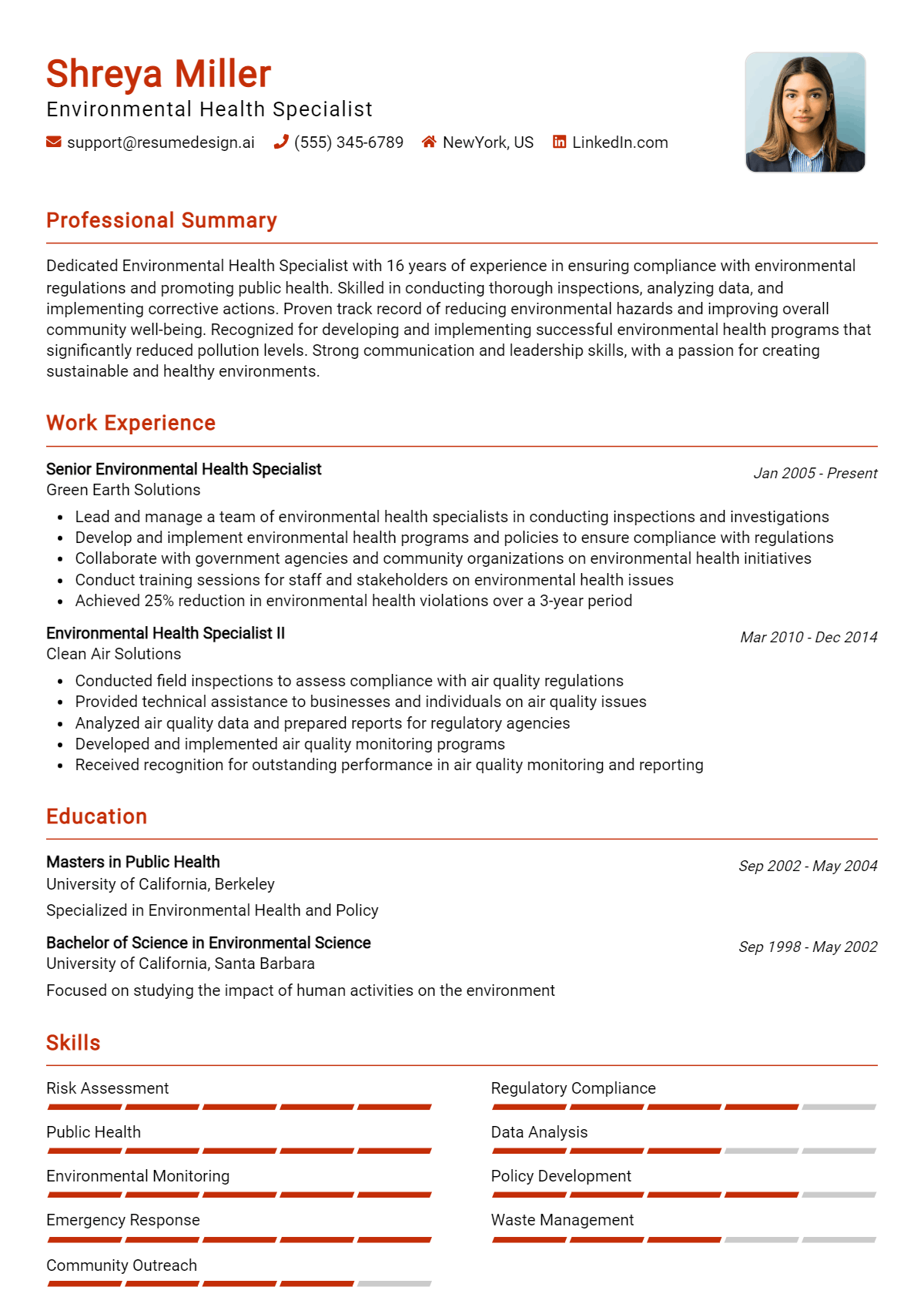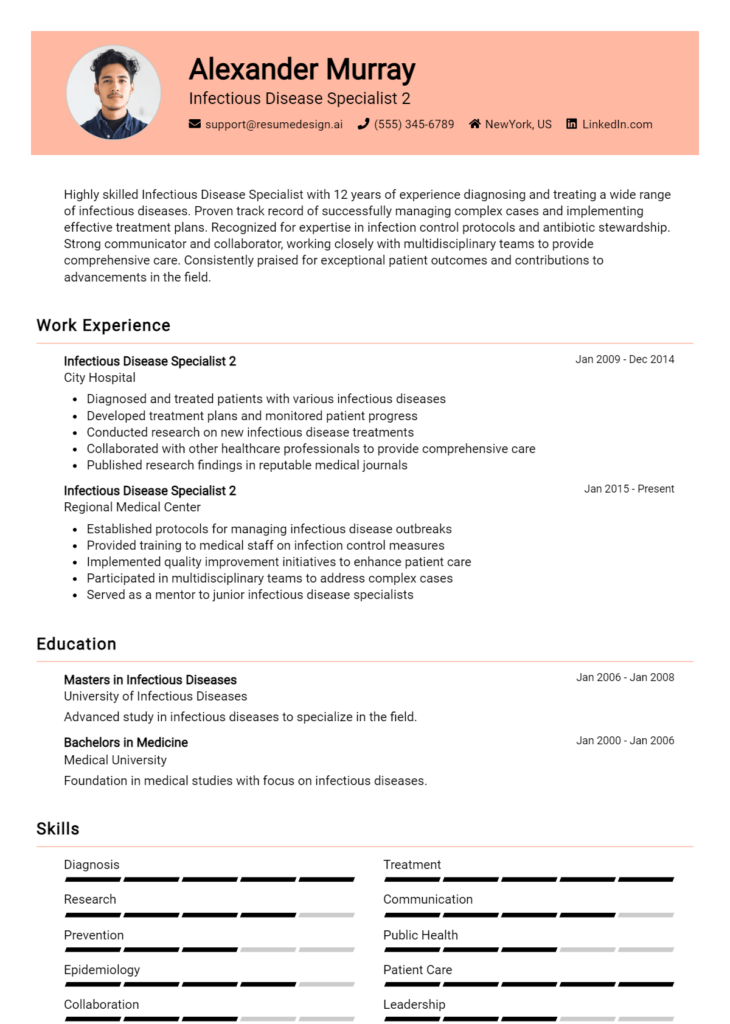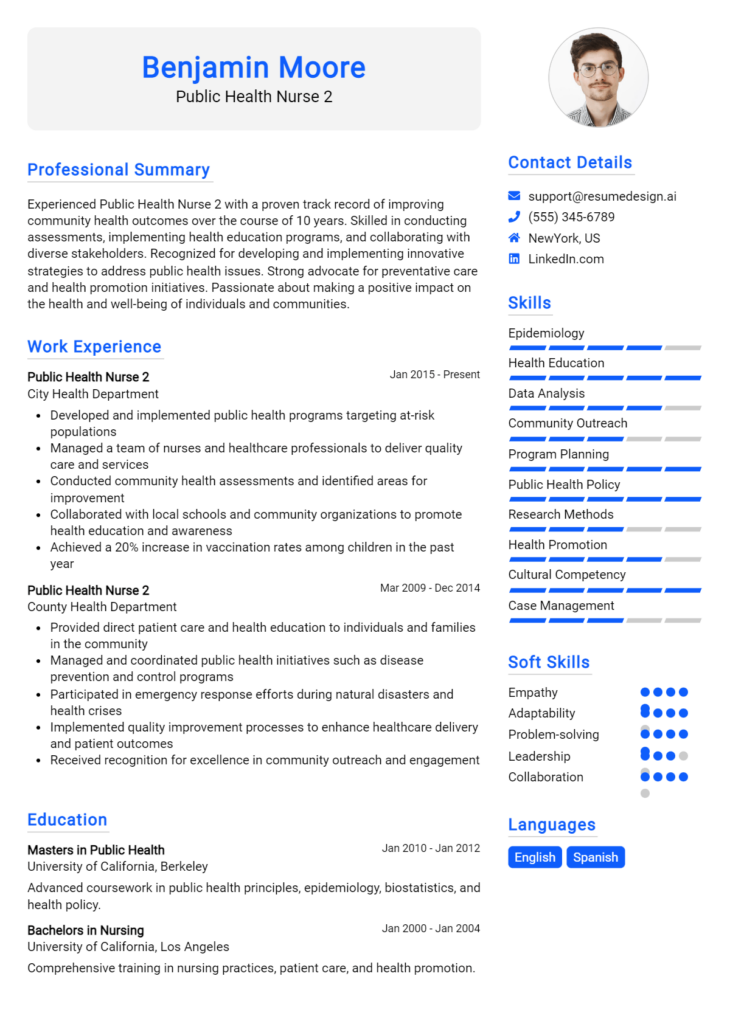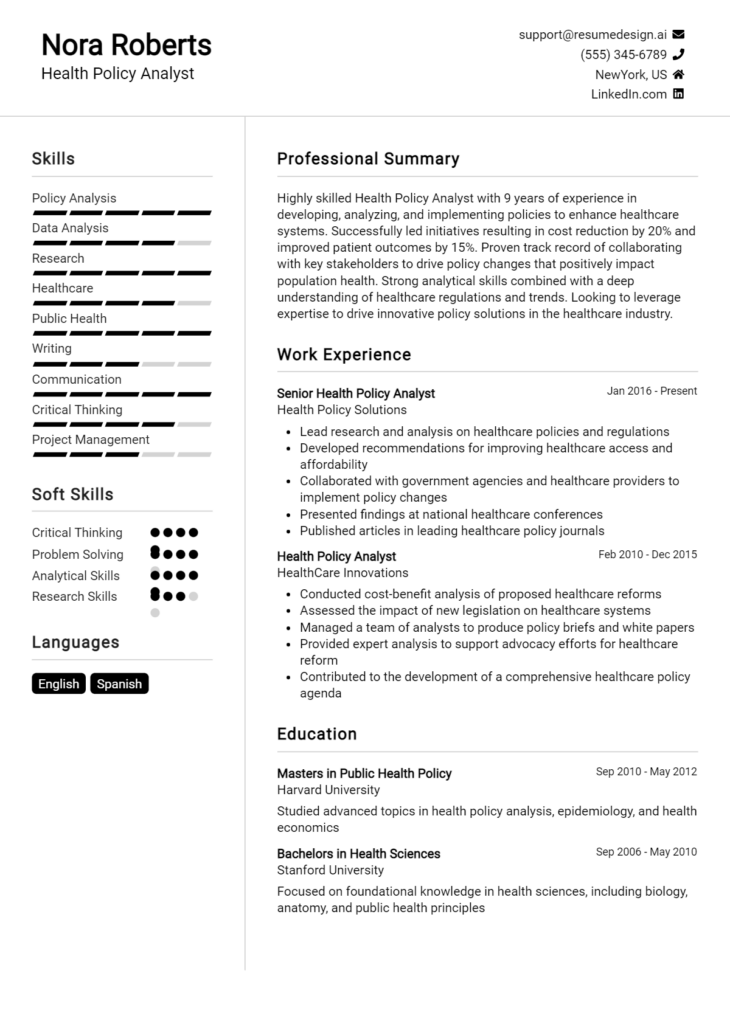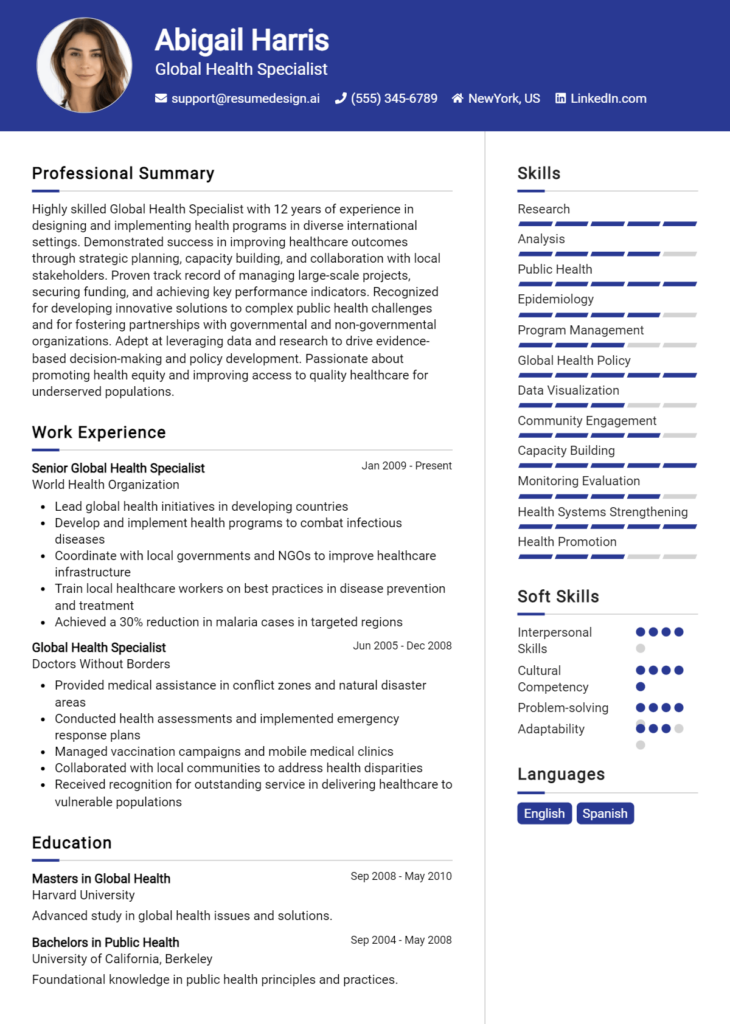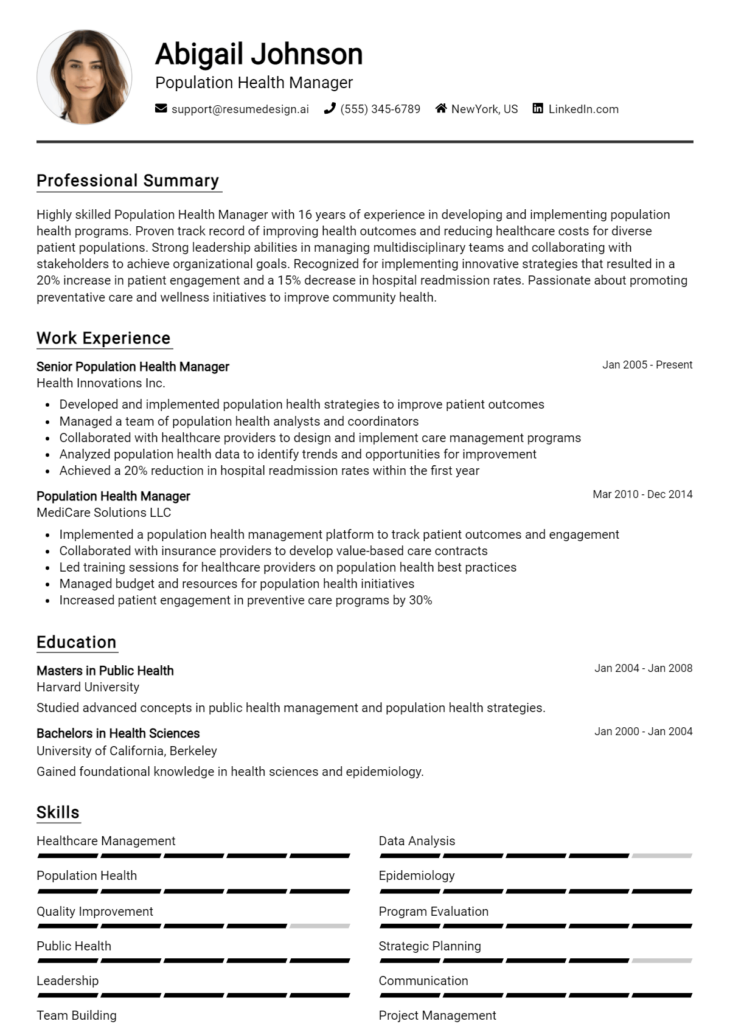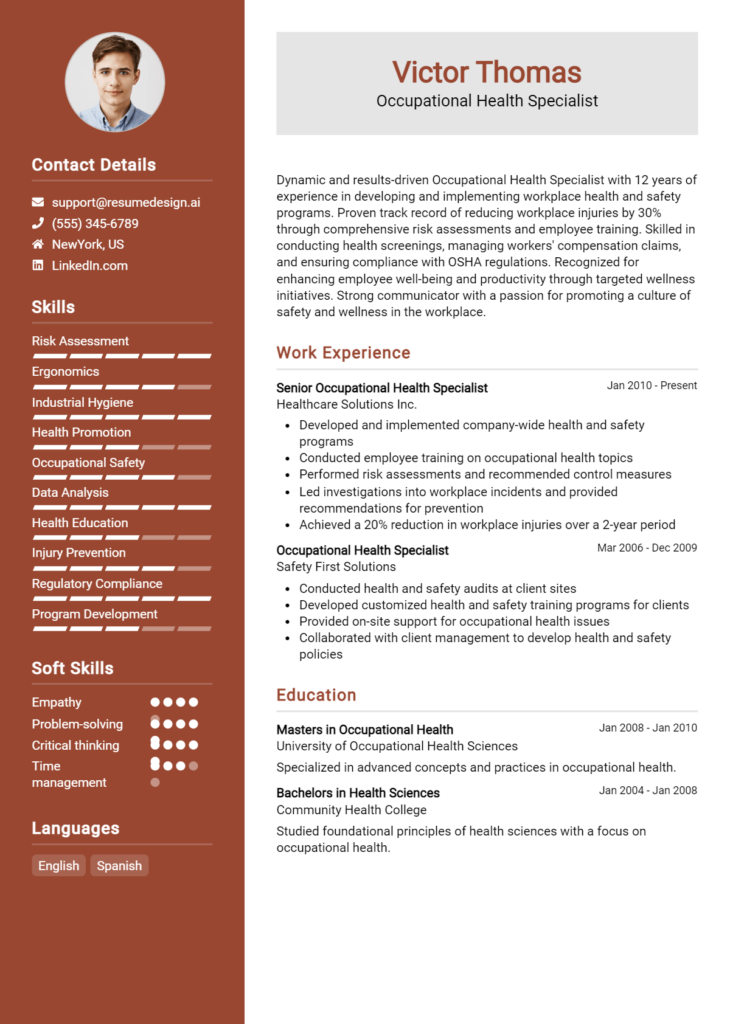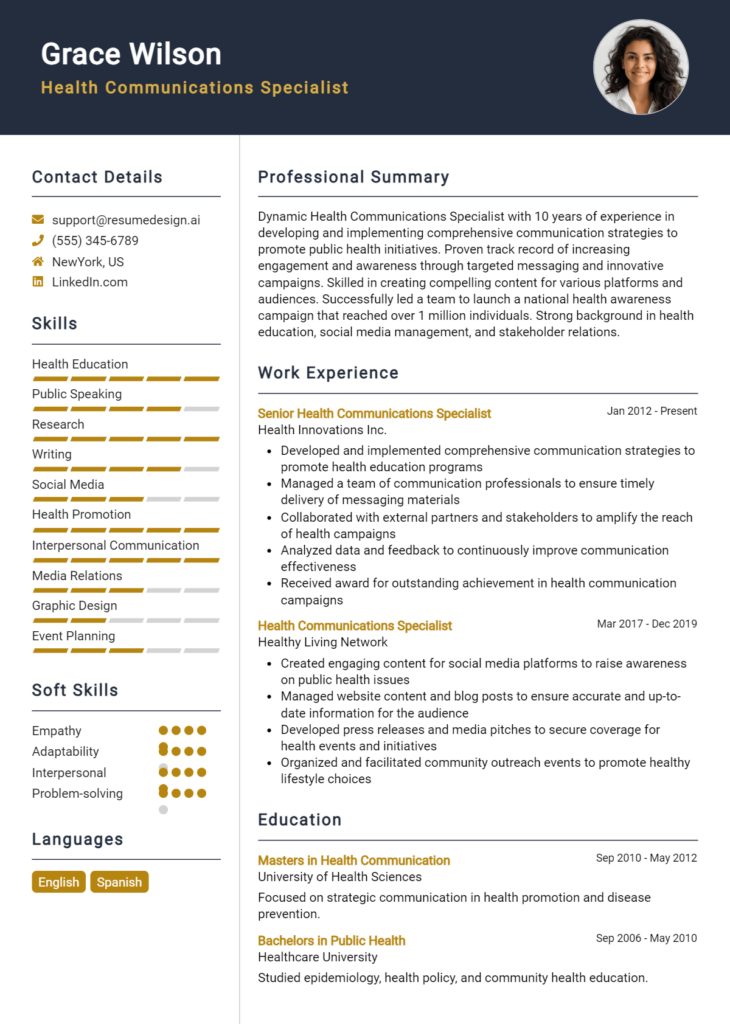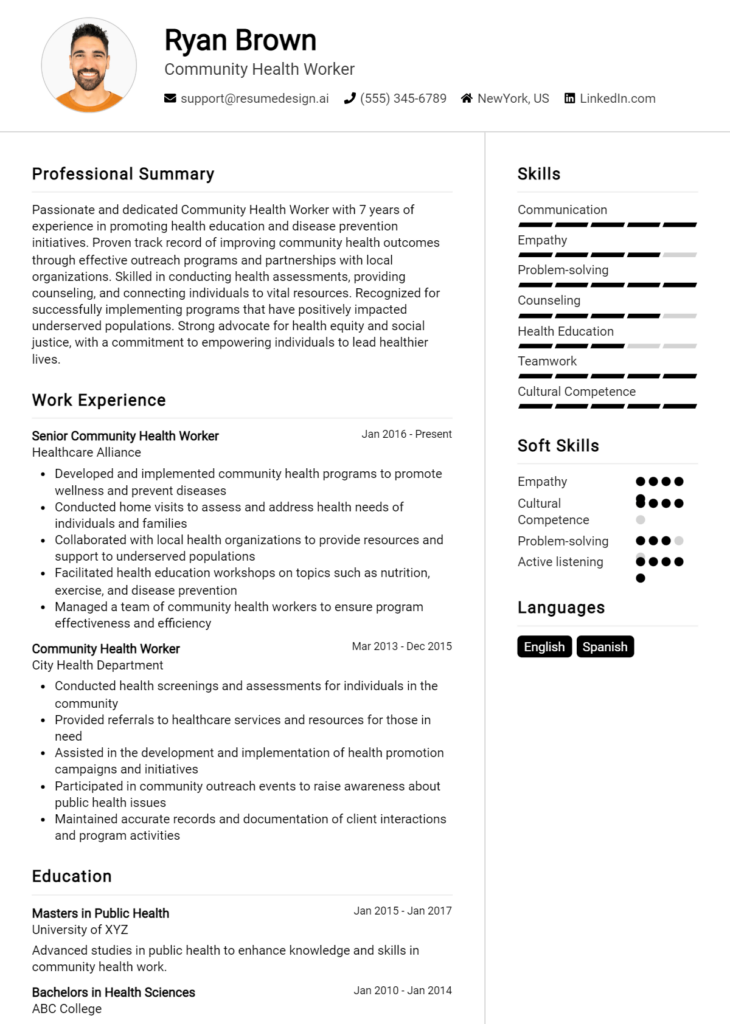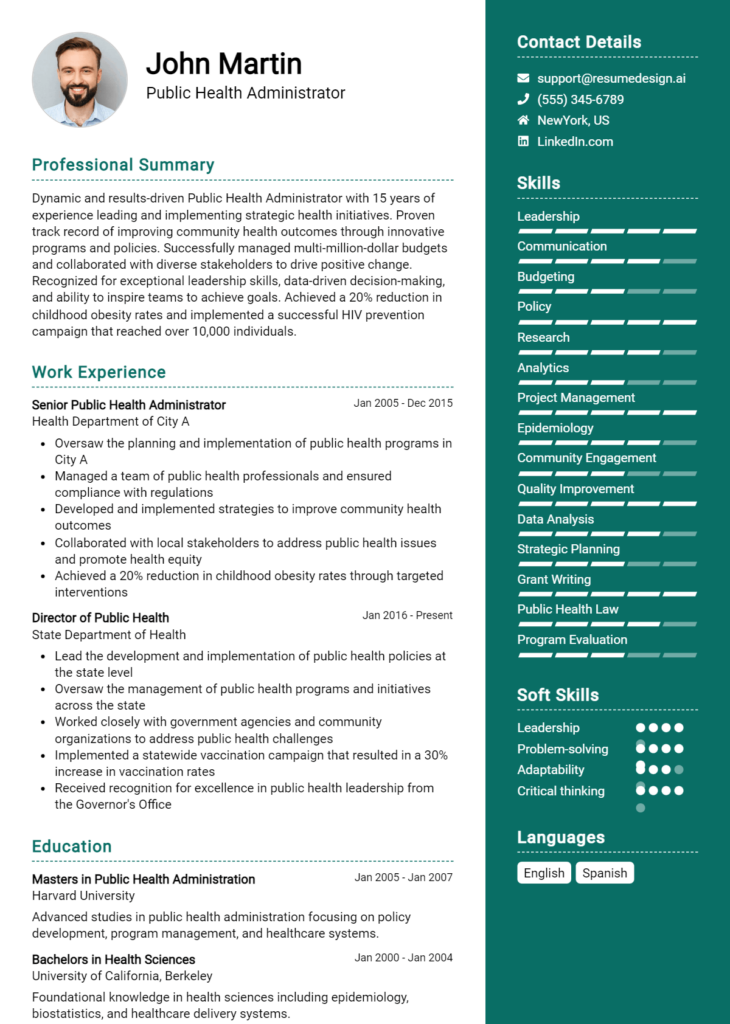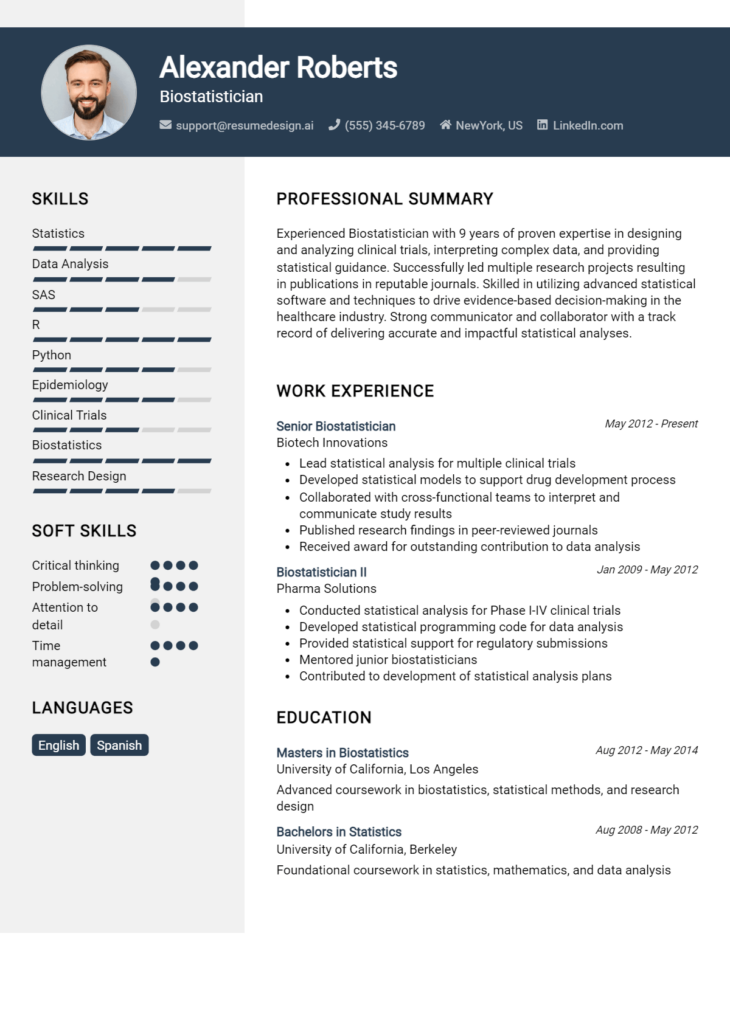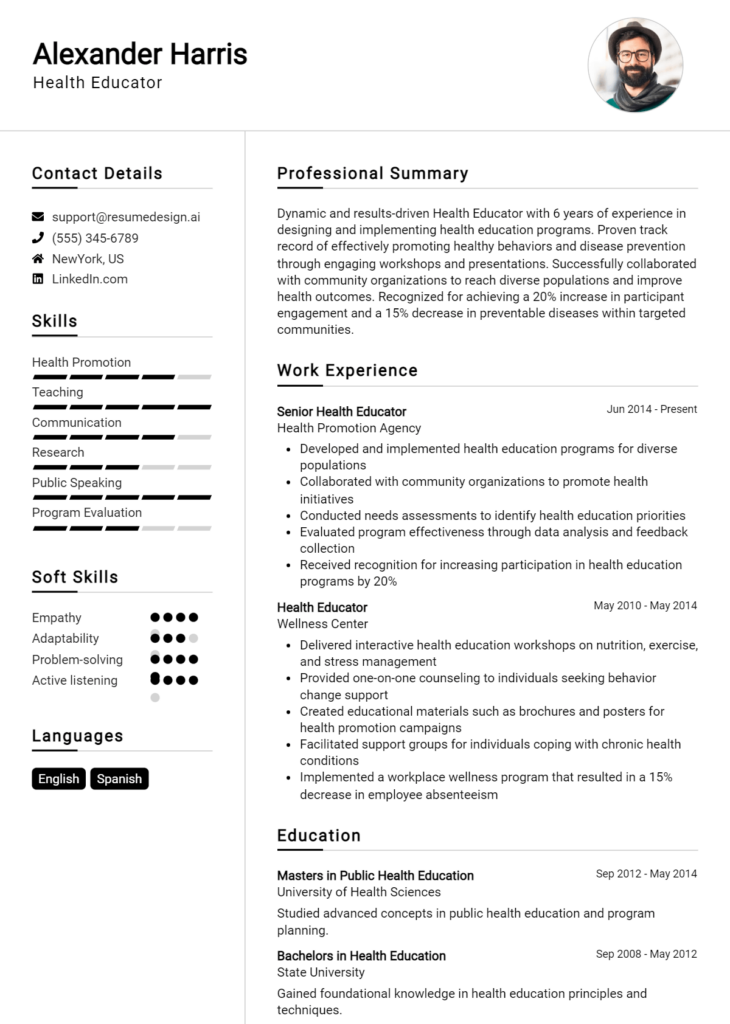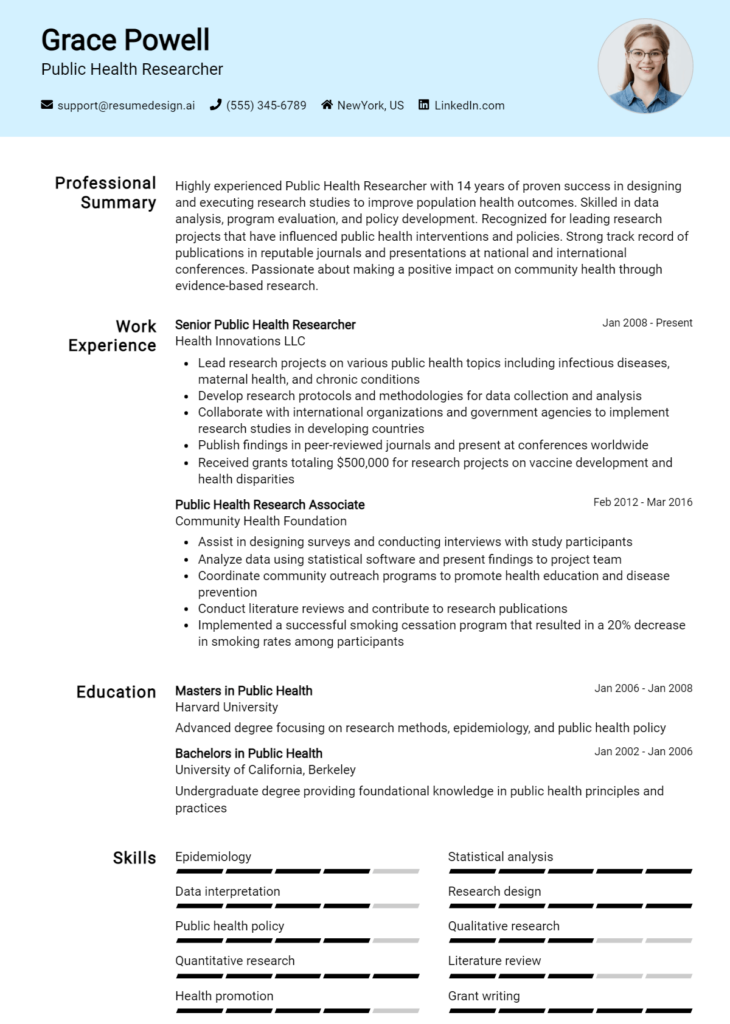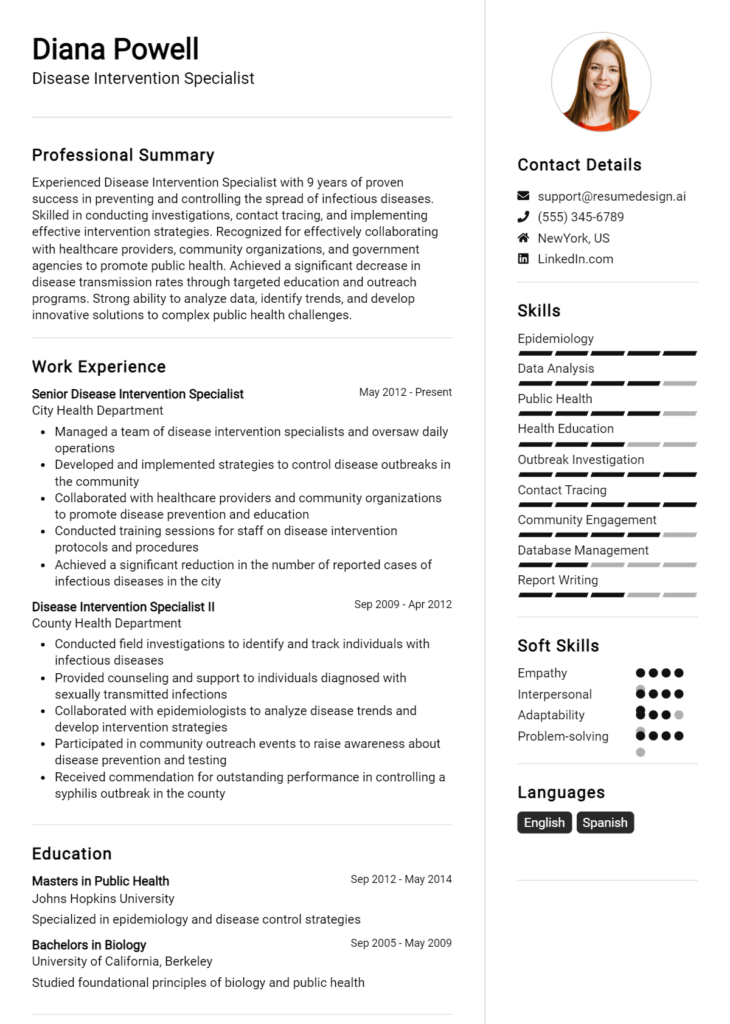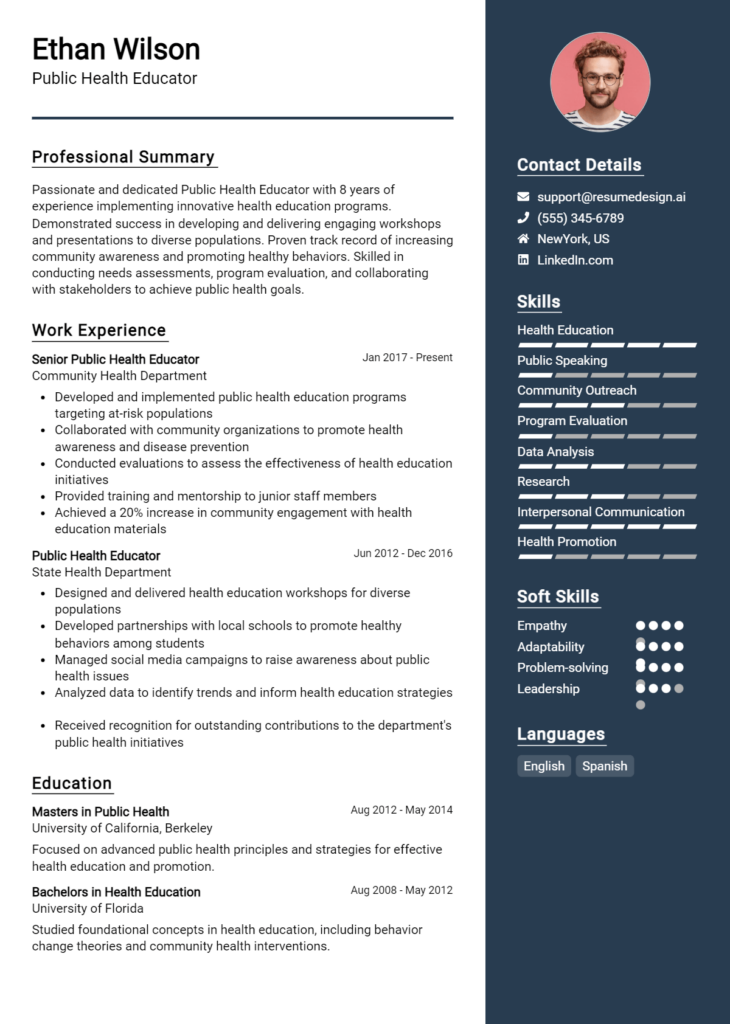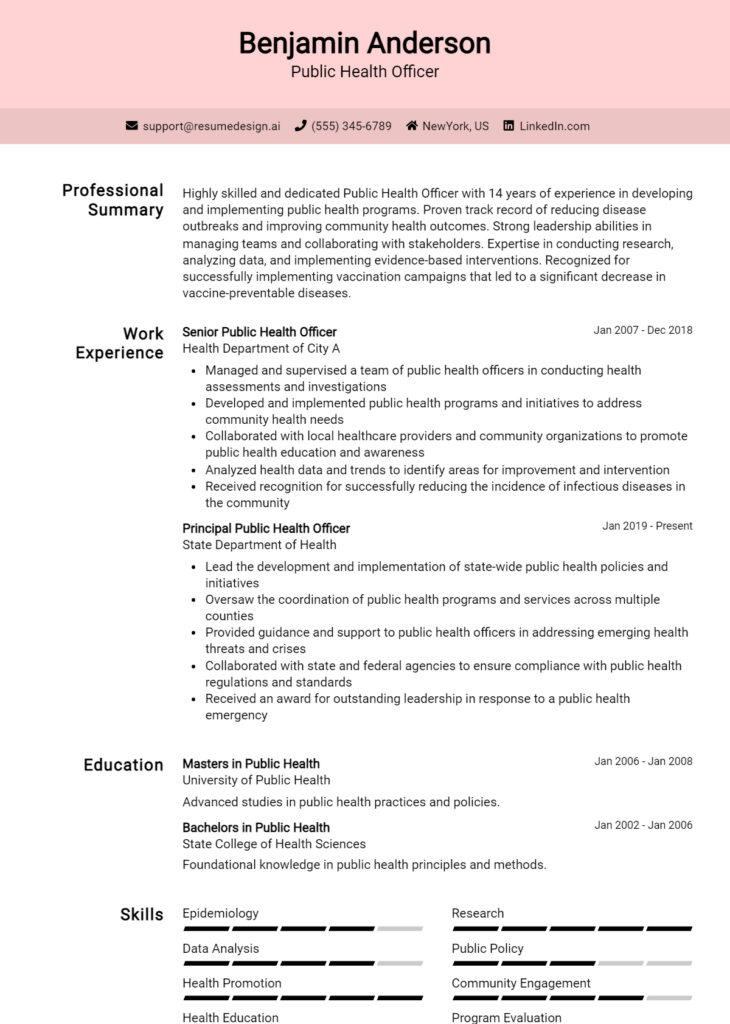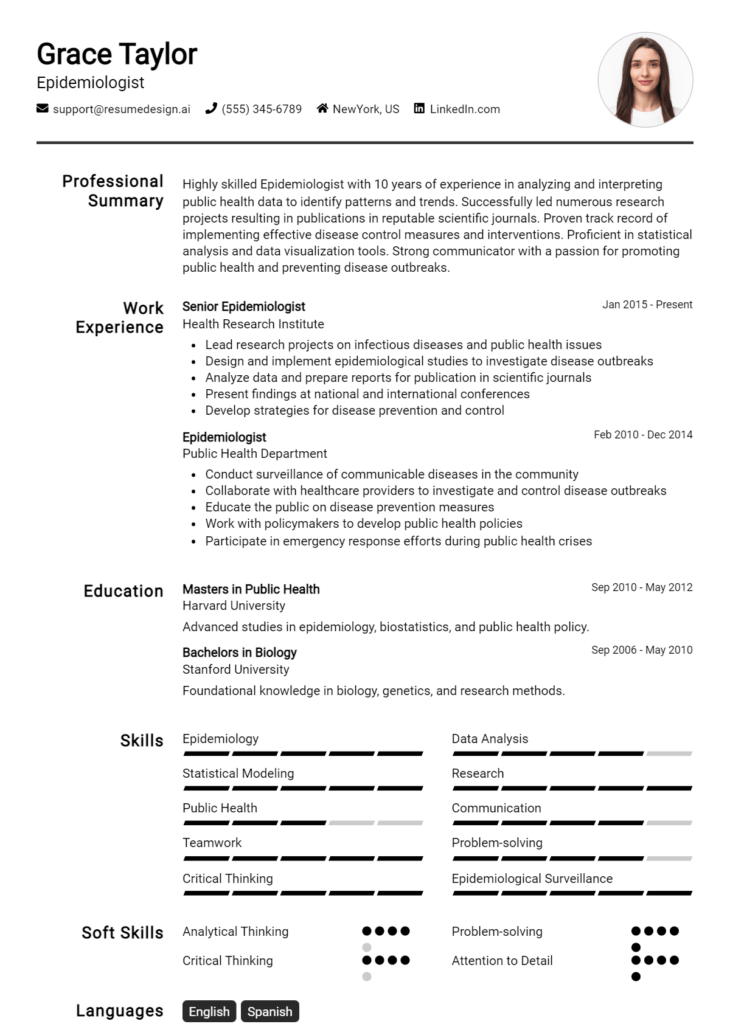Environmental Health Specialist Core Responsibilities
An Environmental Health Specialist plays a crucial role in promoting public health by assessing and mitigating environmental risks. Key responsibilities include conducting inspections, analyzing environmental data, and developing policies to ensure compliance with health regulations. This role requires strong technical, operational, and problem-solving skills, bridging departments like public health, safety, and environmental services. Effective communication and organizational skills are essential for fostering collaboration across functions. A well-structured resume can highlight these qualifications, showcasing your ability to contribute to the organization's goals.
Common Responsibilities Listed on Environmental Health Specialist Resume
- Conduct environmental assessments and inspections to ensure compliance with health standards.
- Analyze data related to air, water, and soil quality to identify potential hazards.
- Develop and implement policies and programs for environmental health improvement.
- Educate the public and stakeholders on environmental health issues and best practices.
- Collaborate with government agencies and organizations to address environmental concerns.
- Prepare reports and documentation for regulatory compliance and stakeholder communication.
- Monitor trends in environmental health and recommend necessary interventions.
- Conduct investigations and respond to environmental health complaints or issues.
- Participate in emergency response planning and implementation related to environmental hazards.
- Provide technical assistance and training to staff and community members.
- Evaluate the effectiveness of environmental health programs and initiatives.
- Stay updated on relevant legislation and emerging environmental health technologies.
High-Level Resume Tips for Environmental Health Specialist Professionals
In the competitive field of environmental health, a well-crafted resume serves as your first opportunity to make a lasting impression on potential employers. This crucial document should not only highlight your skills and achievements but also demonstrate your commitment to promoting public health and environmental safety. A standout resume can set you apart from other candidates and pave the way for interviews and job offers. In this guide, we will provide practical and actionable resume tips specifically tailored for Environmental Health Specialist professionals, ensuring your resume reflects your qualifications and expertise.
Top Resume Tips for Environmental Health Specialist Professionals
- Tailor your resume for each job application by aligning your skills and experiences with the specific requirements outlined in the job description.
- Showcase relevant experience by emphasizing past roles in environmental health, public health, or related fields, focusing on specific responsibilities and projects.
- Quantify your achievements where possible, using metrics and data to demonstrate the impact of your work, such as reductions in pollution levels or improvements in community health outcomes.
- Highlight industry-specific skills, such as knowledge of environmental regulations, risk assessment techniques, and familiarity with public health initiatives.
- Include certifications and licenses relevant to the field, such as Certified Environmental Specialist (CES) or Registered Environmental Health Specialist (REHS).
- Utilize keywords from the job listing throughout your resume to enhance visibility and relevance in applicant tracking systems (ATS).
- Incorporate a professional summary at the top of your resume that succinctly outlines your expertise, career goals, and what you bring to the role.
- Keep your formatting clean and consistent, using bullet points for clarity and ensuring that your contact information is easily accessible.
- Consider including volunteer work or internships that demonstrate your commitment to environmental health, especially if you're early in your career.
By implementing these tips, you can significantly increase your chances of landing a job in the Environmental Health Specialist field. A resume that effectively showcases your qualifications and aligns with industry standards will not only capture the attention of hiring managers but also convey your dedication to fostering a healthier environment for communities.
Why Resume Headlines & Titles are Important for Environmental Health Specialist
In the competitive field of environmental health, a well-crafted resume headline or title serves as the first impression a hiring manager has of a candidate. It is a critical component of a resume that can significantly influence the reader's perception and decision-making process. A strong headline encapsulates the candidate's key qualifications and expertise in a succinct manner, allowing hiring managers to quickly gauge their fit for the role. By using a concise and relevant title that directly relates to the job being applied for, candidates can effectively capture attention and set the tone for the rest of their application.
Best Practices for Crafting Resume Headlines for Environmental Health Specialist
- Keep it concise: Aim for no more than 10-15 words.
- Use specific keywords related to the environmental health field.
- Highlight your unique qualifications or certifications.
- Focus on the value you bring to potential employers.
- Align the headline with the job description to enhance relevance.
- Incorporate measurable achievements where possible.
- Avoid jargon or overly technical language that may confuse.
- Make it compelling to encourage further reading of your resume.
Example Resume Headlines for Environmental Health Specialist
Strong Resume Headlines
"Certified Environmental Health Specialist with 5 Years of Experience in Hazardous Waste Management"
“Proven Track Record in Implementing Public Health Policies for Sustainable Communities”
“Expert in Environmental Risk Assessment and Regulatory Compliance”
“Dynamic Environmental Health Professional Specializing in Community Health Initiatives”
Weak Resume Headlines
“Environmental Health Person”
“Seeking Job in Environmental Health”
The strong headlines are effective because they are specific, highlight relevant experience, and communicate the candidate's unique qualifications in a way that resonates with potential employers. They immediately convey a sense of professionalism and expertise that sets the candidates apart. In contrast, the weak headlines fail to capture attention because they lack specificity and do not convey any key strengths or accomplishments. They appear generic and do not provide the hiring manager with a compelling reason to consider the candidate further.
Writing an Exceptional Environmental Health Specialist Resume Summary
A well-crafted resume summary is crucial for an Environmental Health Specialist as it serves as the first impression on hiring managers. This brief but potent section captures attention by effectively showcasing the candidate’s key skills, relevant experience, and significant accomplishments specific to the environmental health field. A strong summary is concise and impactful, providing a snapshot of the candidate's professional value and aligning with the job they are applying for. This tailored approach not only makes the resume stand out but also resonates with the employer's needs, increasing the chances of securing an interview.
Best Practices for Writing a Environmental Health Specialist Resume Summary
- Quantify Achievements: Use numbers and statistics to highlight your accomplishments, like the percentage of compliance improvements or the number of successful inspections conducted.
- Focus on Skills: Emphasize key skills relevant to environmental health, such as risk assessment, regulatory compliance, and data analysis.
- Tailor the Summary: Customize your summary to align with the specific job description, reflecting the requirements and keywords mentioned in the posting.
- Highlight Relevant Experience: Showcase your work experience that directly pertains to environmental health, including specific projects or roles.
- Use Action Verbs: Start sentences with strong action verbs to convey energy and proactivity, such as "assessed," "managed," or "implemented."
- Keep it Concise: Limit the summary to 3-5 sentences to ensure clarity and maintain the reader's interest.
- Showcase Certifications: Mention relevant certifications or licenses that can enhance your qualifications, such as Certified Industrial Hygienist (CIH) or Registered Environmental Health Specialist (REHS).
- Reflect Passion: Convey enthusiasm for the field of environmental health, demonstrating a genuine commitment to improving public health and safety.
Example Environmental Health Specialist Resume Summaries
Strong Resume Summaries
Dedicated Environmental Health Specialist with over 5 years of experience in conducting comprehensive health assessments. Improved regulatory compliance by 30% through the development of targeted training programs for local businesses.
Results-driven professional with a proven track record of managing over 200 environmental inspections annually, leading to a 25% reduction in health code violations in the community. Skilled in data analysis and risk assessment to enhance local health initiatives.
Environmental Health Specialist with a Master’s degree in Public Health and expertise in environmental risk management. Successfully implemented a waste reduction program that decreased landfill contributions by 40% within one year.
Experienced Environmental Health Specialist adept at collaborating with government agencies and community organizations. Spearheaded a public awareness campaign that increased community participation in health programs by 50%.
Weak Resume Summaries
Environmental Health Specialist with experience in various areas of public health. I have worked on several projects that relate to the environment.
Motivated individual seeking opportunities in environmental health. I am passionate about making a difference in community health.
The examples of strong resume summaries are considered effective because they are specific, quantify achievements, and clearly articulate relevant skills and experiences. In contrast, the weak summaries lack detail, are overly vague, and do not provide measurable outcomes, making it difficult for hiring managers to gauge the candidate's qualifications and contributions to the field.
Work Experience Section for Environmental Health Specialist Resume
The work experience section of an Environmental Health Specialist resume is crucial for demonstrating the candidate's qualifications and expertise in the field. This section not only highlights technical skills related to environmental regulations, assessments, and management practices but also showcases the candidate's ability to lead teams effectively and deliver high-quality results. By quantifying achievements and aligning experiences with industry standards, candidates can present compelling evidence of their capabilities, making them more attractive to potential employers.
Best Practices for Environmental Health Specialist Work Experience
- Highlight specific technical skills relevant to environmental health, such as risk assessment and compliance management.
- Quantify your achievements with metrics, such as percentage improvements or cost savings.
- Include leadership roles and team management experiences that demonstrate your ability to guide and motivate others.
- Align your experiences with industry standards and regulations to showcase your knowledge of best practices.
- Use action verbs to describe your responsibilities, making your contributions clear and impactful.
- Tailor your work experience to reflect the requirements of the job you are applying for.
- Emphasize collaborative projects that demonstrate your ability to work effectively with various stakeholders.
- Provide context for your achievements, explaining the significance of your contributions to the organization or community.
Example Work Experiences for Environmental Health Specialist
Strong Experiences
- Led a team of 5 specialists to conduct comprehensive environmental assessments, resulting in a 30% reduction in compliance violations within one year.
- Developed and implemented a community outreach program that increased public awareness of environmental health issues by 50%, improving community engagement.
- Managed a $250,000 budget for environmental remediation projects, successfully completing all initiatives under budget and ahead of schedule.
- Collaborated with local government agencies to create a hazardous waste management plan, reducing hazardous waste disposal costs by 40% over two years.
Weak Experiences
- Worked on various environmental projects without specifying my role or achievements.
- Participated in team meetings and discussions about environmental health issues.
- Assisted in compliance checks and inspections as needed.
- Helped with reports on environmental conditions without detailing the impact of my contributions.
The examples of strong experiences are considered effective because they provide specific, quantifiable outcomes that demonstrate leadership, technical expertise, and successful collaboration. Each point clearly illustrates the candidate's impact on their organization and the community. In contrast, the weak experiences lack detail and measurable results, making it difficult for potential employers to assess the candidate's capabilities and contributions to their previous roles.
Education and Certifications Section for Environmental Health Specialist Resume
The education and certifications section of an Environmental Health Specialist resume is crucial as it serves as a testament to the candidate's academic foundation and professional qualifications. This section not only showcases the educational background that is essential for understanding environmental health principles but also emphasizes industry-relevant certifications that indicate a commitment to professional development. By including relevant coursework, specialized training, and certifications, candidates can significantly boost their credibility and demonstrate their alignment with the job requirements, thereby enhancing their appeal to potential employers.
Best Practices for Environmental Health Specialist Education and Certifications
- List relevant degrees such as Environmental Science, Public Health, or related fields.
- Include industry-recognized certifications like Certified Environmental Specialist (CES) or Registered Environmental Health Specialist (REHS).
- Highlight any specialized training or workshops that are pertinent to environmental health practices.
- Provide details of relevant coursework that aligns with the responsibilities of an Environmental Health Specialist.
- Emphasize continuous education efforts, such as ongoing professional development courses or seminars.
- Tailor the education section to the specific job description and requirements of the position applied for.
- Maintain clarity and conciseness, ensuring that each credential is presented in an easily readable format.
- Consider certifications that demonstrate proficiency in specific tools or technologies relevant to environmental health.
Example Education and Certifications for Environmental Health Specialist
Strong Examples
- Bachelor of Science in Environmental Health, University of XYZ, 2020
- Certified Environmental Specialist (CES), National Environmental Health Association, 2021
- Coursework in Environmental Risk Assessment, Toxicology, and Public Health Policy
- Completion of Hazardous Waste Operations and Emergency Response (HAZWOPER) training, 2022
Weak Examples
- Associate Degree in General Studies, Community College ABC, 2018
- Certification in Basic First Aid, Red Cross, 2019 (not specialized for environmental health)
- Coursework in Non-Environmental Subjects such as Art History and Literature
- Outdated certification in Environmental Management from 2015 (no longer recognized)
The strong examples are considered effective because they directly relate to the qualifications and skills required for an Environmental Health Specialist role, showcasing relevant degrees, certifications, and coursework that enhance the candidate’s expertise. In contrast, the weak examples reflect qualifications that lack relevance to the field of environmental health, either because they are too general, outdated, or not recognized in the industry, thereby failing to support the candidate’s fit for the position.
Top Skills & Keywords for Environmental Health Specialist Resume
An effective resume for an Environmental Health Specialist is pivotal in showcasing both the technical and interpersonal skills necessary for success in the role. These professionals play a crucial part in protecting public health and the environment by assessing and mitigating health risks associated with environmental factors. By emphasizing relevant skills, candidates can demonstrate their ability to analyze data, implement regulations, and communicate effectively with various stakeholders. A well-rounded skill set not only enhances employability but also reflects a candidate's commitment to promoting environmental health and safety. For those looking to craft an impactful resume, understanding the importance of both hard and soft skills is essential.
Top Hard & Soft Skills for Environmental Health Specialist
Soft Skills
- Strong communication skills
- Critical thinking and problem-solving
- Attention to detail
- Team collaboration
- Adaptability and flexibility
- Time management
- Empathy and compassion
- Public speaking and presentation abilities
- Conflict resolution
- Leadership qualities
Hard Skills
- Knowledge of environmental regulations and policies
- Proficiency in data analysis tools and software
- Experience with environmental sampling and monitoring techniques
- Ability to conduct risk assessments
- Familiarity with toxicology and epidemiology
- Strong research skills
- Proficiency in GIS (Geographic Information Systems)
- Understanding of environmental health laws
- Ability to develop and implement health and safety programs
- Experience with statistical analysis and report writing
By focusing on these essential skills along with relevant work experience, Environmental Health Specialists can create compelling resumes that effectively showcase their qualifications and readiness to tackle the challenges of this vital profession.
Stand Out with a Winning Environmental Health Specialist Cover Letter
Dear [Hiring Manager's Name],
I am writing to express my interest in the Environmental Health Specialist position at [Company Name], as advertised on [Job Board/Company Website]. With a Master's degree in Environmental Science and over five years of experience in public health and environmental management, I am confident in my ability to contribute to your team and help promote sustainable health practices. My expertise in assessing environmental risks, conducting inspections, and implementing health regulations aligns well with the objectives of your organization.
In my previous role at [Previous Company Name], I successfully led initiatives that improved air and water quality in our local community. By collaborating with various stakeholders, including government agencies and non-profit organizations, I developed comprehensive assessments and action plans that resulted in a 30% reduction in environmental health hazards over two years. My strong analytical skills and attention to detail enable me to identify potential risks and implement effective solutions proactively, ensuring compliance with local, state, and federal regulations.
I am particularly drawn to this position at [Company Name] because of your commitment to promoting public health and environmental sustainability. I am excited about the opportunity to leverage my skills in data analysis, community outreach, and regulatory compliance to support your mission. I am also eager to contribute to innovative programs that educate the community about environmental health issues and encourage sustainable practices.
Thank you for considering my application. I look forward to the possibility of discussing how my background, skills, and enthusiasm align with the goals of [Company Name]. I am eager to bring my passion for environmental health to your team and contribute to the well-being of our community.
Sincerely,
[Your Name]
[Your Phone Number]
[Your Email Address]
Common Mistakes to Avoid in a Environmental Health Specialist Resume
When crafting a resume for the role of an Environmental Health Specialist, it's crucial to present your qualifications and experiences effectively. Many candidates make common mistakes that can detract from their overall presentation and decrease their chances of landing an interview. Avoiding these pitfalls can enhance the clarity and impact of your resume, making it stand out in a competitive job market.
Lack of Specific Keywords
Not incorporating relevant industry-specific keywords can make your resume less likely to pass through Applicant Tracking Systems (ATS) and catch the attention of hiring managers.Generic Job Descriptions
Using vague or generic descriptions for previous roles fails to highlight your unique contributions and accomplishments. Tailor your job descriptions to reflect specific duties and achievements relevant to environmental health.Ignoring Certifications and Licenses
Failing to mention relevant certifications (such as Certified Industrial Hygienist or Registered Environmental Health Specialist) can overlook key qualifications that set you apart from other candidates.Overloading with Irrelevant Information
Including unrelated work experiences or skills can clutter your resume. Focus on information that directly pertains to environmental health to maintain clarity and relevance.Using Passive Language
Employing passive language can weaken the impact of your accomplishments. Use strong action verbs to demonstrate your proactive contributions and results in previous roles.Neglecting Education Details
Omitting important educational information, such as your degree, major, and relevant coursework, can lead to gaps in your qualifications. Ensure this information is clearly presented.Poor Formatting and Organization
A cluttered or poorly organized resume can be difficult to read. Utilize clear headings, bullet points, and a clean layout to make your resume visually appealing and easy to navigate.Failing to Proofread
Grammatical errors or typos can create an unprofessional impression. Always proofread your resume multiple times or ask someone else to review it before submission to ensure it is error-free.
Conclusion
As an Environmental Health Specialist, you play a crucial role in ensuring public health and safety by assessing environmental risks and implementing solutions to mitigate those risks. Your work may involve monitoring air and water quality, enforcing regulations, and educating the community about environmental health issues. In this article, we’ve explored the skills and qualifications needed for this vital role, including knowledge of environmental science, regulatory compliance, and effective communication.
To stand out in this competitive field, it’s essential to have a polished and professional resume that highlights your relevant experience and accomplishments. Take the time to review your Environmental Health Specialist resume and ensure it effectively showcases your expertise and dedication to improving community health.
If you're looking to enhance your resume, consider utilizing resources like resume templates, which can provide a strong foundation for your document. Additionally, a resume builder can help you create a customized resume that caters to your specific experiences and skills. Don’t forget to check out resume examples for inspiration and insights into effective formatting and content. Lastly, to complement your resume, you might want to explore cover letter templates that can help you make a great first impression.
Take action today by reviewing and updating your resume to reflect your qualifications as an Environmental Health Specialist, and utilize these valuable tools to create a standout application.

